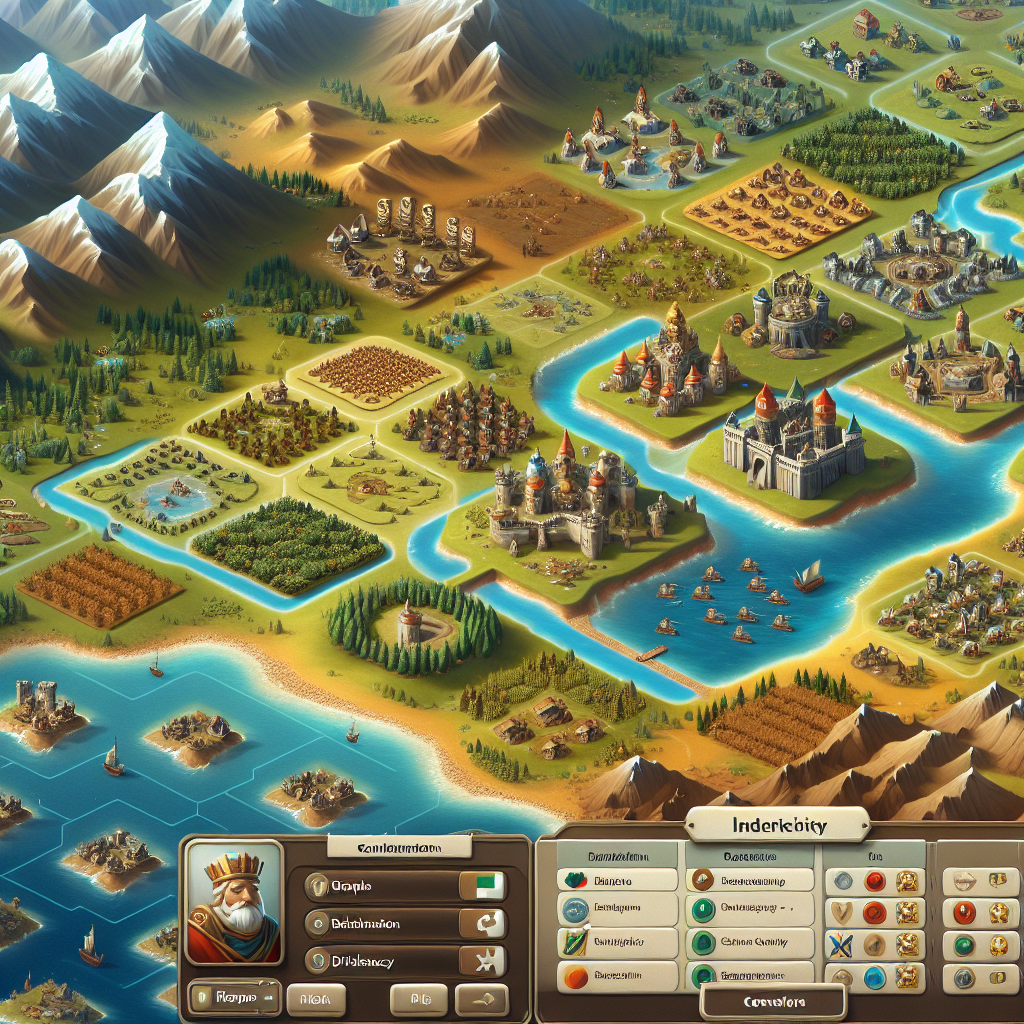“Rise of Kingdoms” is a real-time strategy game developed by Lilith Games, offering an immersive experience in which players build and expand their own civilizations. Version 4.3 introduces a range of new features and improvements, enhancing gameplay and strategic depth. Players can choose from various historical civilizations, each with unique commanders and units, to lead their empire to glory. The game emphasizes exploration, alliance-building, and tactical warfare, allowing players to engage in large-scale battles and intricate diplomacy. With its rich graphics and dynamic mechanics, “Rise of Kingdoms” continues to captivate strategy enthusiasts worldwide.
Mastering the Art of War: Advanced Strategies in Rise of Kingdoms 4.3
Rise of Kingdoms, developed by Lilith Games, has captivated millions of players worldwide with its intricate blend of strategy, resource management, and real-time combat. As the game evolves, so too must the strategies employed by its players. Version 4.3 introduces a host of new features and adjustments, necessitating a deeper understanding of advanced tactics to maintain a competitive edge. Mastering the art of war in this latest iteration requires not only a grasp of the fundamental mechanics but also an ability to adapt to the nuanced changes that have been implemented.
One of the most significant updates in Rise of Kingdoms 4.3 is the rebalancing of commanders. Commanders are the backbone of any successful campaign, and their abilities can turn the tide of battle. With the latest adjustments, players must reassess their commander pairings and skill upgrades. For instance, commanders who previously excelled in open-field battles may now find their effectiveness slightly diminished, necessitating a shift in strategy. It is crucial to stay informed about these changes and experiment with different combinations to discover the most potent pairings.
In addition to commander rebalancing, the introduction of new civilizations adds another layer of complexity to the game. Each civilization comes with unique units and bonuses, which can significantly impact gameplay. Selecting the right civilization to complement your playstyle is paramount. For example, a player who favors aggressive tactics might benefit from a civilization with strong offensive units, while a more defensive player might prefer one with robust fortifications and resource-gathering capabilities. Understanding the strengths and weaknesses of each civilization will enable players to make informed decisions and optimize their strategies.
Resource management remains a cornerstone of success in Rise of Kingdoms. The latest update has introduced new resource nodes and adjustments to gathering rates, making efficient resource collection more critical than ever. Players must prioritize upgrading their resource buildings and deploying gatherers strategically to ensure a steady supply of essential materials. Additionally, forming alliances with other players can provide significant advantages in resource acquisition. By coordinating with allies, players can share resources, defend each other’s territories, and launch joint attacks on common enemies.
The importance of scouting and intelligence gathering cannot be overstated in version 4.3. With the introduction of new map features and hidden objectives, having accurate and up-to-date information about enemy movements and resources is vital. Players should invest in upgrading their scout units and regularly dispatch them to explore the map. This proactive approach will help identify potential threats and opportunities, allowing for more informed decision-making.
Furthermore, the latest update has enhanced the mechanics of alliance warfare. Coordinated attacks and defenses are now more rewarding, emphasizing the need for effective communication and collaboration within alliances. Players should actively participate in alliance activities, contribute to joint efforts, and share strategic insights with their allies. A well-coordinated alliance can dominate the battlefield, secure valuable territories, and achieve long-term success.
Finally, adapting to the dynamic nature of Rise of Kingdoms requires continuous learning and flexibility. The game developers frequently release updates and balance changes, which can alter the effectiveness of certain strategies. Staying engaged with the community, participating in discussions, and learning from experienced players can provide valuable insights and keep you ahead of the curve. By remaining adaptable and open to new ideas, players can refine their strategies and maintain their competitive edge in the ever-evolving world of Rise of Kingdoms.
In conclusion, mastering the art of war in Rise of Kingdoms 4.3 demands a comprehensive understanding of the game’s mechanics, a keen awareness of the latest updates, and a willingness to adapt and innovate. By focusing on commander rebalancing, civilization selection, resource management, scouting, alliance warfare, and continuous learning, players can navigate the complexities of the game and achieve strategic dominance.
Top 5 Commanders to Dominate in Rise of Kingdoms Lilith Games Strategy 4.3

In the ever-evolving world of Rise of Kingdoms, Lilith Games Strategy 4.3 has introduced a plethora of new features and updates that have significantly altered the dynamics of gameplay. Among these changes, the role of commanders has become even more pivotal, as they are the linchpins of any successful strategy. To navigate this complex landscape, it is essential to identify the top commanders who can lead your civilization to dominance. This article will delve into the top five commanders who have proven to be indispensable in the current meta.
Firstly, Alexander the Great stands out as a formidable commander, renowned for his versatility and robust skill set. His active skill, “Shield of the King,” provides a powerful shield that absorbs damage, making him an excellent choice for both offensive and defensive maneuvers. Additionally, his passive skills enhance infantry units’ attack and defense, making him a well-rounded commander who can adapt to various battle scenarios. Transitioning from Alexander, we find that his synergy with other commanders, such as Richard I, further amplifies his effectiveness, creating a nearly impenetrable frontline.
Next, we turn our attention to Yi Seong-Gye, a commander whose prowess in archery is unparalleled. His active skill, “Rain of Arrows,” deals massive area-of-effect damage, making him a nightmare for enemy troops clustered together. Moreover, his passive skills boost the attack and defense of archer units, making him an indispensable asset in ranged combat. Yi Seong-Gye’s ability to decimate enemy forces from a distance makes him a strategic choice for players who prefer a more calculated approach to warfare.
Transitioning to cavalry commanders, we cannot overlook the impact of Genghis Khan. Known for his lightning-fast cavalry charges, Genghis Khan’s active skill, “Mongol Supremacy,” deals significant damage to a single target, while his passive skills enhance the mobility and attack of cavalry units. This makes him an ideal commander for hit-and-run tactics, allowing players to strike swiftly and retreat before the enemy can mount a counterattack. Genghis Khan’s speed and power make him a crucial component in any cavalry-focused strategy.
In the realm of support commanders, Aethelflaed emerges as a key figure. Her active skill, “Invasion,” deals damage to multiple targets and reduces their attack and defense, weakening enemy forces considerably. Furthermore, her passive skills increase the experience gained by troops and enhance the effectiveness of mixed-unit armies. Aethelflaed’s ability to debilitate enemy forces while bolstering her own makes her an invaluable commander for both PvE and PvP scenarios.
Lastly, we must consider the strategic importance of Richard I. Known for his exceptional healing abilities, Richard I’s active skill, “Soul of the Crusaders,” heals a portion of his troops’ health and reduces incoming damage. His passive skills further enhance the defense and healing capabilities of infantry units, making him a stalwart defender in prolonged battles. Richard I’s resilience and healing prowess make him a cornerstone of any defensive strategy, ensuring that your forces can withstand even the most relentless assaults.
In conclusion, the top commanders in Rise of Kingdoms Lilith Games Strategy 4.3 each bring unique strengths to the battlefield, and their effective utilization can significantly influence the outcome of any conflict. By understanding the capabilities and synergies of Alexander the Great, Yi Seong-Gye, Genghis Khan, Aethelflaed, and Richard I, players can craft strategies that leverage these commanders’ strengths to dominate their adversaries. As the game continues to evolve, staying informed about the top commanders will remain crucial for achieving success in Rise of Kingdoms.
Resource Management Tips for Success in Rise of Kingdoms 4.3
In the ever-evolving world of Rise of Kingdoms, resource management stands as a cornerstone for achieving success. As players navigate through the intricate layers of this strategy game, understanding how to efficiently manage resources becomes paramount. The latest update, version 4.3, introduces new dynamics that necessitate a refined approach to resource management. This article aims to provide comprehensive tips to help players optimize their resource utilization and maintain a competitive edge.
To begin with, it is essential to recognize the primary resources in Rise of Kingdoms: food, wood, stone, and gold. Each of these resources plays a critical role in the development of your city, the training of troops, and the research of technologies. Therefore, a balanced approach to gathering and utilizing these resources is crucial. One effective strategy is to prioritize the upgrading of resource production buildings. By ensuring that farms, lumber mills, quarries, and gold mines are consistently upgraded, players can secure a steady flow of resources, which is vital for sustained growth.
Transitioning to the next point, it is important to consider the role of gathering commanders. Commanders with specialized gathering skills can significantly enhance resource collection rates. For instance, commanders like Constance and Sarka possess talents that boost gathering speed and capacity. Assigning these commanders to resource nodes can expedite the accumulation of resources, thereby providing a substantial advantage. Additionally, equipping gathering commanders with appropriate gear and utilizing gathering talents can further amplify their efficiency.
Moreover, the strategic use of resource items can provide a significant boost during critical moments. Resource items, which can be obtained through various in-game activities and events, should be used judiciously. For example, during times of war or when preparing for major upgrades, tapping into these reserves can ensure that resource shortages do not hinder progress. However, it is advisable to avoid using these items frivolously, as they are finite and should be reserved for pivotal moments.
Another key aspect of resource management is participation in alliance activities. Alliances offer numerous benefits, including resource assistance and access to alliance resource centers. By actively participating in alliance events and contributing to the collective goals, players can earn valuable rewards that bolster their resource reserves. Furthermore, alliances often engage in territory expansion, which can provide additional resource nodes for members to gather from, thereby enhancing overall resource availability.
In addition to these strategies, it is imperative to maintain a vigilant approach to resource protection. In the competitive environment of Rise of Kingdoms, resource raids by enemy players are a constant threat. To mitigate this risk, players should invest in upgrading their storehouse, which protects a portion of their resources from being plundered. Additionally, strategic city placement within alliance territory can offer a layer of protection, as allies can provide support during attacks.
Lastly, efficient resource management extends to the judicious allocation of resources towards city development and troop training. It is essential to strike a balance between upgrading buildings, researching technologies, and training troops. Overcommitting resources to one aspect at the expense of others can lead to bottlenecks and hinder overall progress. Therefore, a well-rounded approach that ensures steady advancement across all facets of the game is recommended.
In conclusion, mastering resource management in Rise of Kingdoms version 4.3 requires a multifaceted approach that encompasses efficient gathering, strategic use of items, active alliance participation, vigilant protection, and balanced allocation. By adhering to these tips, players can optimize their resource utilization and pave the way for sustained success in the game.Rise of Kingdoms by Lilith Games, in its Strategy 4.3 update, continues to enhance the player experience with refined mechanics, improved graphics, and new strategic elements. The update introduces additional civilizations, commanders, and events, providing players with more diverse gameplay options and deeper strategic depth. The balance adjustments and quality-of-life improvements further solidify the game’s standing as a leading mobile strategy title. Overall, Strategy 4.3 significantly enriches the game’s content and playability, ensuring sustained engagement and enjoyment for both new and veteran players.




